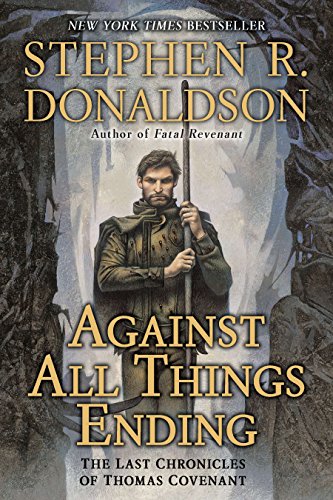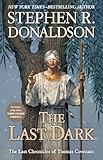 Against All Things Ending by Stephen R. Donaldson
Against All Things Ending by Stephen R. Donaldson
 Against All Things Ending is Stephen Donaldson’s third entry in the four-book series THE LAST CHRONICLES OF THOMAS COVENANT. Or, as one may think of them, his ninth book in the long-running series detailing the story of Covenant, and later Linden Avery, in the fantastical world known as The Land. I’ll refer readers to the plot summaries in our reviews of the prior books — mostly as refresher notes, since nobody should be picking this book up who hasn’t read the previous two, and in my mind, nobody should be reading the “last” chronicles who hasn’t read the previous two chronicles. Not only would you be lost in basic plot and character points, but you’d be missing many of the thematic and philosophical underpinnings of the story and the direction of its long narrative arc.
Against All Things Ending is Stephen Donaldson’s third entry in the four-book series THE LAST CHRONICLES OF THOMAS COVENANT. Or, as one may think of them, his ninth book in the long-running series detailing the story of Covenant, and later Linden Avery, in the fantastical world known as The Land. I’ll refer readers to the plot summaries in our reviews of the prior books — mostly as refresher notes, since nobody should be picking this book up who hasn’t read the previous two, and in my mind, nobody should be reading the “last” chronicles who hasn’t read the previous two chronicles. Not only would you be lost in basic plot and character points, but you’d be missing many of the thematic and philosophical underpinnings of the story and the direction of its long narrative arc.
Those themes and subjects remain familiar in Against All Things Ending: guilt, power, powerlessness, innocence, the “crime of power,” self-doubt, self-loathing, the balance of wonder and horror in the world, and more. This is, as I said in an earlier review, “serious” fantasy. Even those who generally sneer at the genre would be hard pressed to call Donaldson’s work, and especially this book, “escapist fiction.” This is both strength and weakness for the series. At its best, the series raises and explores in thought-provoking, stimulating fashion profound issues of human existence and interaction with both other people and with the universe at large. At its worst, it can devolve into introspection that can be overly repetitive or that veers too close into self-pity and whining. At its best, it balances its more philosophical and psychological aspects with stirring bursts of action and imagery that can leave one breathless. (I offer up Mhoram’s Charge as one scene that has been etched indelibly in my reading mind for decades.) At its worst, it presents us with perfunctory moments of action that seem to serve the mere purpose of breaking up the self-examination.
For the most part, throughout the series, Donaldson has tipped to the right side, which is why I’m still reading about Thomas Covenant decades after I first met him. Unfortunately, Against All Things Ending tipped the wrong way for me and, for one of the few times in my Donaldson reading experience, I had to really push myself to finish. There were too few stirring or beautiful moments, too few original conceptual arguments or explorations, and too many (and too long) scenes of Linden Avery lacerating herself for her actions. Or her inactions. Or her untimely actions. Or her… well, you get the point. In a book one, or a book two, this would have been tolerable, though I probably still would have argued for some editing. The problem is we’re nine books into Donaldson’s explorations of the themes and subjects mentioned above and there just wasn’t new material in all this. It is often insightful (the first few paragraphs or pages at least). It is often precisely and eloquently expressed. And thus it would make you stop and linger over the lines you just read and really think about them, really make you question how power works in the world, how individuals really carry (or not) their burdens. Or at least, it would, had you not already stopped and thought about all of that in earlier books. And here it just goes on scene after scene after scene, and often paragraph after paragraph after paragraph within those scenes. Not only do you want to scream, “I get it!”, you want to scream “I got it in Book 8! Or book 7!” I can deal with bleak; I can deal (to a point) with self-introspection, self-doubt, self-pity even, the morass of depression and paralysis, etc. But don’t ask me to deal with all that without purpose, and that’s unfortunately what I felt here, because none of it cast any further illumination.
Covenant’s arguments with the Haruchai don’t feel different enough from the arguments he or Avery had with them in the past, the sacrifices made don’t feel all that different from the sacrifices we’ve seen in the past. Despair in all its sundry forms seems to wear all the same garments we’ve seen in all the times we’ve watched characters face it down in earlier books.
The feeling of being swamped or worse, bored (due to familiarity) by all this was exacerbated because those aspects that usually balance these heavy psychological scenes are themselves repetitive. They can no longer rescue the reader from the swamp because they’re all too familiar and so feel rote, like we’re all just going through the motions. The impact of the Giants’ ability to laugh, their love of story, their capacity for grief, their steadfast fellowship and trust — all of that gets diminished in impact each time it is pulled out and again, by book nine, that’s beginning to add up to a lot of times. The same holds true for the other of the Land’s denizens: the Stonedowners, the Haruchai, the Ramen, the Ranyhn, and so on.
I could happily pull paragraphs and scenes out of context and have a great intellectual meal out of them, could present them to a class and get a great discussion going. But as part of a fictional context, as part of a narrative of plot and character, Against All Things Ending doesn’t succeed. Oh, things happen. Plot moves forward. Some characters die, some new ones arise, some change. But there’s no sense of movement. No sense of progress. It’s a bridge novel, but it feels like a bridge suspended in mid-air, unconnected to land at either end of its length.
The book is sort of like that friend who at first you really enjoyed having over but who now just won’t go home, so you’re only kinda listening to them tell the same stories you heard last time he was over, nodding your head here and there, dipping into the conversation now and then, all the while looking forward to bed and the night’s conclusion.
Though that is, to be honest, a little unfair or overly dismissive. There is excellent writing here. Precise, if sometimes arcane, use of language and simile and metaphor and symbol (nobody sends me to the dictionary more than Donaldson, and I rarely feel disappointed in doing so or feel it’s purely for the sake of showing off). Expression of deep thought. Much of weight and importance. But as a reading experience? Outside of a few scenes I can’t say it was enjoyable. Which at times can still work if it’s intellectually stimulating or engaging enough, which is its own form of enjoyment I suppose. But one still lacking here due to the over-familiarity of its content. For those reasons, it’s difficult to recommend, though it’s hard to see how fans (and who gets to a book nine save fans?) get to the concluding novel without it. So the best I can say is read it, but don’t feel bad about skimming sections. You’ll know which ones when you get to them because you’ve seen them before.
The Chronicles of Thomas Covenant the Unbeliever — (1977-2013) Publisher: He called himself Thomas Covenant the Unbeliever because he dared not believe in the strange alternate world in which he suddenly found himself. Yet he was tempted to believe, to fight for the Land, to be the reincarnation of its greatest hero…
The First Chronicles
The Second Chronicles
The Last Chronicles














Excellent review, William. I so looked forward to reading this novel last December. I pushed my way through it in four days to my own surprise because I felt exactly the same way you did about the book. And Mhoram (and his Charge) … oh how I miss him!
Bill–excellent review!